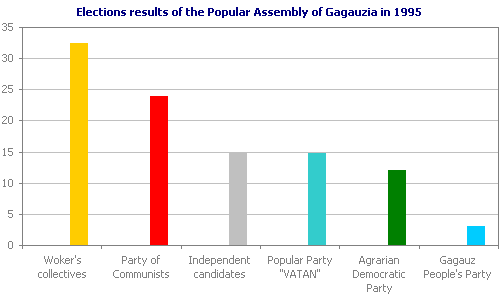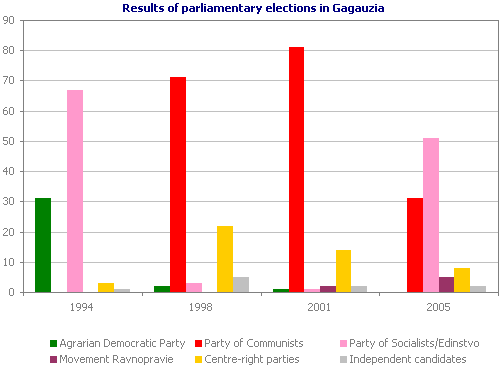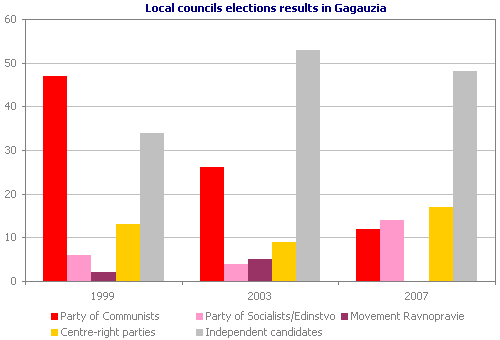ADEPT | Gagauzia 2016 | Presidential 2016 | Elections 2015 | Bashkan 2015 | Gagauzia 2012 | Political Parties
Are regional parties really necessary?
Introduction
The March 16-scheduled elections for the People’s Assembly of Gagauzia (PAG) have revealed the problem of regional parties. This problem is pretty old, but the forthcoming elections for the People’s Assembly raised debates between local and international experts. Such debates took place in October 2007 with the participation of representatives of local authorities and political forces. National parties self-compromised then, as they do not know regional problems well and regional parties could finally propose solutions needed for an adequate organisation of the regional political life.
On December 21, 2007, the Parliament of Moldova adopted the new law on political parties, which ignored the demand to allow the registration of regional political parties and this fact produced an immediate reaction. Gagauz Governor (Bashkan) Mihail Formuzal invited on December 25 potential participants in the March 16, 2008 elections to get registered as independent candidates, thus confirming his opinion regarding discrimination of national parties. Formuzal’s appeal dissatisfied the well-known Party of Socialists in Gagauzia, which made public plans to nominate its candidates for the forthcoming elections as a sign of protest. These facts prove that there is no adequate answer to this question.
International practice
According to international practice, as a rule, regional parties are not prohibited. In fact, it may be hard for them to meet the registration norms. Secondly, the international practice demonstrates that the existence or non-existence of regional parties does not depend on the fact if the country is federative or unitary. In all likelihood, the way central authorities estimate potential separatism risks posed by officially recognised political structures is a basic criterion for authorisation or ban of regional parties.
But the last criterion is not cogent enough, if comparing two states which faced or still face separatist movements. Russia prohibits regional parties though it is a federation of 83 subjects (built in the last years after reorganisation) and has a big territory. On the other side, in Spain, a federation de jure which is considered so de facto, there is at least one regional party in each of the 17 autonomous units. The Constitutions of both countries[1] stipulate the right of citizens to freedom of meetings, including into political parties, but the norms on registration of political parties make their existence impossible in Russia, but it is very easy to meet them in Spain.
As a result, only 15 parties survived in the Russian Federation after recent amendments to the legislation on parties and their re-registration in 2007. On the other hand, the Spanish Interior Ministry had registered more than 1,500 parties in 1976–2002, but none of them was erased from the register, though most of them have been dissolved. Arguing on democracy and stability of these two countries is possible, considering this issue in the light of existence or non-existence of regional parties.
In this regard, it would be justifiable to cite an example which is closer to the Republic of Moldova in terms of state system and administrative-territorial structure. This is Portugal, which is an E.U. member and this fact combats any doubts regarding respect for democratic norms, but this country is an exception because its Constitution includes a special article that bans the regional parties. According to Article 6 of the Constitution, Portugal is a unitary state built to respect the autonomy of local authorities and democratic decentralisation of administration; the Azure and Madeira Islands are autonomous regions with own political and administrative status and ruling bodies. Regardless of the autonomy of the two islands sanctioned by the law concerned, Article 51 (4) bans the regional parties.
Practice of Moldova
Given the fact that Gagauz political forces seek the legalisation of regional bodies, the examples mentioned above were deliberately selected to indicate the extreme positions regarding regional parties. On one side, there is Russia, which is respected by Gagauz political forces but this federal state is severely restricting regional parties. On the other side, there is Spain, which encounters very dangerous separatist movements but has more than a liberal legislation on parties in general and regional parties in particular. All other examples, including Portugal and Moldova by association, are between the two extremes. The following conclusion may be drawn: no arguments but a lucid thinking is functioning as regards regional parties.
As regards the Republic of Moldova, it is worth to note that regional parties did not pose any risks and, therefore, the reserved attitude of Moldovan authorities is groundless. Regional parties were activating accordingly to the Law 718-XII from September 17, 1991 in 1991–1998. Consequences of their activity were unimportant. Table 1 clearly reveals that residents of the Gagauz autonomy trusted more candidates on behalf of staffs, independent competitors and candidates on behalf of national parties at elections for the People’s Assembly when regional parties existed.
Table 1. Elections results of the Popular Assembly of Gagauzia in 1995

The modification of the law on parties in 1998, so that to ban the re-registration of regional parties, targeted at small parties no matter national or regional, rather than at regional parties. New the law was amended because votes of electors were disseminated du to abundance of parties (more than 60 parties were registered then).
Therefore, Moldova legalised regional parties at the beginning and finally prohibited them without indicating any necessity or possible threat from these parties. Even more, relations between Chisinau and Comrat had strained because of the activity of informal movements in Gagauzia — Gagauz Halky in the early 1990s and Yedinaya Gagauzia in 2003–2006, when the leader of this movement, Mihail Formuzal, faced pressures aimed to prevent his political ascension. These examples confirm one more time that other problems fuel dangerous conflicts between central and local public authorities, rather than regional parties per se. Of course, conflicts between Chisinau and Comrat affect the rating of national parties in region, especially during parliamentary elections, which in fact recommend choosing parties in detriment of independent candidates, who are not credited with chances to succeed to the Parliament.
Table 2. Results of parliamentary elections in Gagauzia

At present, when Gagauz elites claim the right to build regional parties, there are no grounded reasons to refuse them.
The position of the Gagauz autonomy is curious in this regard, as it does not use their constitutional right to get what they need. According to the constitutional amendments operated in 2003, the People’s Assembly holds the right to legal initiative and may ask the Moldovan Parliament to modify the law on parties, in order to allow the registration of regional parties. Reference to the absurd situation that residents of Gagauzia were awarded the right to territorial autonomy on the basis of ethnic criteria but they are refused a more important right — to register regional political parties — would be the strongest argument in this respect.
There are also other arguments, if Gagauz elites would want to register regional parties at all costs. This is not a caprice of Gagauz residents, but a necessity which could strongly emerge immediately after the March 16 elections, when building a majority in the People’s Assembly will be part of the agenda. It means that the increasing preference of Gagauz electors for independent candidates in detriment of competitors nominated by parties may obstruct an adequate structure of the regional parliament.
Should this happen, Gagauz authorities would have the right to seek the legalisation of regional parties, though it is well-known that independent candidates are part of unregistered political groups created around strong personalities such as Gagauz Governor Mihail Formuzal and Comrat Mayor Nicolae Dudoglo. In addition, Gagauz authorities shall not be obstructed to establish the own proportional system for elections for the People’s Assembly; that means the necessity to allow regional parties when electors of the region do not want to vote national parties. The examples mentioned above indicate a clear conclusion — regional parties shall be allowed, if residents of Gagauzia need them.
Table 3. Local councils elections results in Gagauzia

Finally, one more argument for the need to legalise regional parties is the fact that the ruling party of Moldova also needs to legalise them, at least at level of political rhetoric. In this respect, President Vladimir Voronin admits the possibility that Transnistria could also participate in the March 2009 parliamentary elections as a distinct electoral district in which 18–20 lawmakers would be elected on party lists. Should this idea develop, regional parties in Transnistria would be registered for sure. Transnistrians would unlikely join national parties of Moldova to organise elections in the Transnistrian electoral district. If so, a question emerges here: legalising regional parties in Transnistria and banning them in Gagauzia would not worsen the situation? In addition, if what Moldovan president has said is true, why the new law on political parties adopted on December 27, 2007 does not legalise the regional parties?
Conclusions
Given all facts mentioned above, there is no serious argument to ban regional parties in the Republic of Moldova from point of view of law and logic, as well as statistics. Even more, Gagauz residents as taxpayers have got one more argument to seek the legalisation of regional parties, as the new law on parties stipulates budgetary financing for parties.
The fact that the People’s Assembly of Gagauzia did not use the right awarded four years ago and did not submit a legal initiative to the Moldovan Parliament to seek the legalisation of regional parties raises doubts that Gagauz residents really need regional parties. It is rather an internal political battle in the region.
Although the cynicism shall be excluded from the Chisinau-Comrat relations, those admitting that the legalisation of regional parties may turn the middle of tensions between the centre and the region to the internal political life of the region. According to practice, a fair attitude towards existing problems is the best strategy in countries such as Moldova.
Gagauz Governor Mihail Formuzal has called for a more active participation of residents of the autonomy in political and administrative life at national level. This right viewpoint must be appreciated because it aims to combat the isolation fuelled by a number of factors including linguistic. But the legalisation of regional parties shall not deepen this isolation.
The last remark is based on the idea that citizens of a state may be members of one political party only. In this regard, should most competent citizens from the Gagauz autonomy become members of regional parties, would this membership obstruct their succession to national parties, which is done via parties in all modern democracies?
- ↑ Article 6 of the Spanish Constitution and Article 30 of the Russian Constitution


